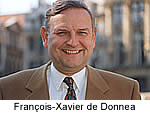De Donnea says no time to be lost on FP6 implementation
The head of the European Research council under the Belgian presidency of the EU, François-Xavier de Donnea, has called for a concerted effort to approve the content of the next framework programme (FP6) to ensure the smoothest possible transition between new scientific projects and work already underway. Speaking at a press conference in Brussels on 7 September, Mr de Donnea said it was crucial to avoid a gap between the current and next framework programmes: 'Time is short. If there were to be a chronological gap between the Fifth Framework Programme ending in December 2002 and the beginning of the Sixth Framework Programme, beginning in January 2003, the whole European scientific community would suffer the consequences. To ensure continuity, the Belgian presidency must reach a common position for the Sixth Framework programme to be fully adopted during the first six month period of 2002.' He added that for the six month duration of the Belgian presidency, 'I will do all that is humanly possible to reach a common position [on FP6].' Mr de Donnea also spoke of the priorities that emerged from his recent tour of Europe's capital cities, which included visits to his Member State counterparts in charge of research, to hear their concerns. He was keen to emphasise the areas of agreement which emerged from this tour, in particular widespread support for the proposed FP6 budget of 17.5 billion euro and for the principle of 'concentration' advocated by the Commission. De Donnea said that under this principle, FP6 would concentrate on key, large scale projects to achieve the best results for Europe and avoid becoming a 'shopping list' of small, diverse projects. De Donnea spoke of five main areas for concern which emerged from his EU tour. He said that many Member States were anxious to implement measures to safeguard the position of small organisations, such as SMEs and small research units, in large scale FP6 programmes. Many were also keen to see some kind of transition procedure put in place to oversee the integration of current, smaller-scale projects into the larger scale projects of FP6, such as networks of excellence or integrated projects. De Donnea also said that many Member States were pushing for measures to guarantee the transparency of the Commission's proposal to hand over more project management power to Member State authorities, adding that the idea of an independent administrator was under discussion. Mr De Donnea also reported that many Member States and the European Parliament have questioned control of the huge budget slice, 12 billion euro, which is to be allocated to FP6 thematic priorities. To ensure transparent and secure management of this budget, the Commission would like to set up a programme-wide committee covering all eight sectoral priorities, in addition to three specific committees each covering information technology, biotechnology, and the rest of the thematic areas in greater depth. The minister also said that the Parliament and many Member States had highlighted certain areas within the thematic priorities which they would like to see emphasised, including marine technology, health and security, traditional diseases, the environment and sustainability, renewable energy, and surface transport. Mr De Donnea went on to underline current progress on the EURATOM framework programme. He said that most of the Member States were concerned primarily with nuclear safety and the management of nuclear waste. He said also that many Member States were looking to thermonuclear fusion as 'the energy of the future,' and would like to see the budget for research in this area increased. He added that many of them wanted to see the fusion machine installed on European soil, not in Canada, Japan or Russia, Europe's partners in the fusion energy project. Finally, Mr De Donnea outlined the targets to be achieved for progress to be made within the necessary timescale. He said that to allow the Research council to make real headway at its meeting on 30 October, it was important for the European Parliament to adopt its opinion on the FP6 programme at the first reading during the second plenary session in October. Mr De Donnea also said that more needed to be done to remove barriers to researcher mobility. Responding to concerns raised by a member of the audience, he agreed that Belgium was losing talented third country researchers to the US because of cumbersome immigration procedures which could take months to process. He said that he had urged the Belgian minister of the interior to deal with the situation and emphasised that barriers to researcher mobility remained a problem for all Member States. He added: 'We are fully devoted to putting pressure on all member states to improve the situation.' He said these difficulties would be further discussed at a conference on researcher mobility being organised by the Belgian presidency on 17 and 18 September. Mr De Donnea also emphasised the importance of improving science's public image, and attracting more young people and women into scientific careers. He said that for too many people, 'science is something to be scared of, something which makes monsters,' and action was needed to remedy this.



